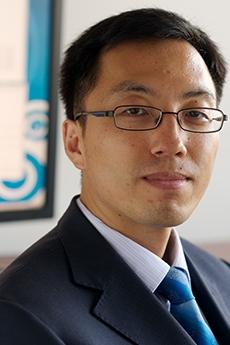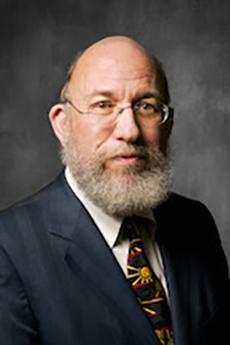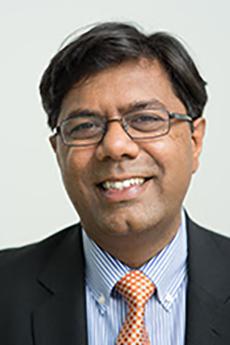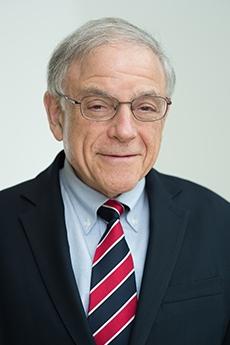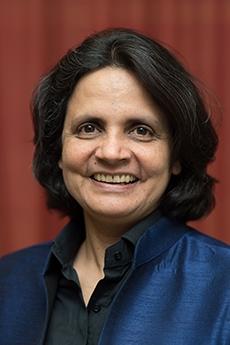Faculty News
Research:
Dr. Volker Sorger (ECE) has won a two-year, $650,000 grant from the Air Force Office of Scientific Research to study 2D materials photonics. The award is for the project “Monolithically-Integrated 2D-Materials Photonics: Scalable and Foundry-Near Processes and Device Concepts.” The work will have both military and civilian applications. The abstract is available on the ECE department website.
Publications:
Dr. Michael Keidar (MAE) and a large, worldwide team of coauthors have published a new article that was recently featured in Physics of Plasmas. The citation is: I. D. Kaganovich, A. Smolyakov, Y. Raitses, E. Ahedo, I. G. Mikellides, B. Jorns, F. Taccogna, R. Gueroult, S. Tsikata, A. Bourdon, J-P. Boeuf, M. Keidar . . . A. Fruchtman, “Perspectives on Physics of E×B Discharges Relevant to Plasma Propulsion and Similar Technologies,” Physics of Plasmas, 27, 120601 (2020).
Dr. Tianshu Li (CEE) and his co-authors have published the following paper: B. Cao, S. Chen, X. Jin, J. Liu, and T. Li, “Short-Range Order in GeSn Alloy,” ACS Applied Materials & Interface, 2020, 12, 51, 57245–57253. This first-of-its-kind study unravels some of the puzzling material properties of GeSn alloy, a key material that represents a disruptive technology for mid-infrared technology. Some of the high-profile applications of GeSn include Lidar (for example, on autonomous vehicles), night vision, and biochemical sensing. GeSn alloy is currently being intensively investigated because it not only can potentially outperform the materials used in the market, but it also is much cheaper. The team's finding shows for the first time that a prevailing view in the field—that SiGeSn alloy is a homogeneous random solid solution—is not accurate. They are now able to answer a highly interesting question in the field, namely, whether the GeSn alloy of the most important composition can ever be made and be stable; they have concluded that it can be.
Media Mentions
Dr. David Broniatowski (EMSE) provided comments to NBC News in the December 18 article “Covid vaccine and mask conspiracies succeed when they appeal to identity and ideology,” and to Vox in the December 19 article “Social media companies are already losing the vaccine misinformation fight.”
Dr. Michael Keidar (MAE) was featured in the January 2 GW Today article “SEAS Professor Elected to National Academy of Inventors.”
Mr. Scott Sklar (energy director, Environmental & Energy Management Institute) authored the letter to the editor “Energy efficiency is doable and cost-effective now,” which appeared in the December 17 edition of the Washington Post. In his letter, Prof. Sklar took issue with statements of a December 13 Washington Post Outlook essay claiming it is a myth that “existing technology can meet the Paris goals” on climate change mitigation, and he provided data from recent studies showing that premise to be false.
Conferences & Presentations:
Dr. Lorena Barba (MAE) was an invited panelist at the virtual meeting of the American Physical Society Division of Fluid Dynamics. The panel, held November 24, discussed the topic of underrepresented minorities in research and was organized by Dr. Luciano Castillo (Purdue) and Sean Garrick (University of Illinois Urbana Champaign). On December 3, Dr. Barba was an invited speaker at the Computing Insights UK conference, now in its 31st year, and organized by the Science and Technology Facilities Council, STFC. She also served as a speaker on December 14 in “Solving the Reproducibility Crisis in the Digital Era—Panel Debate on Science with Hanne Kjöller, Lorena Barba and Members of Swedish Parliament.” The panel was hosted by KTH Royal Institute of Technology and streamed live to YouTube. (video)
On December 9, Dr. Kartik Bulusu (MAE) presented a lecture at the MJ College of Engineering and Technology, Osmania University (Hyderabad, India). The title of the lecture was “Engineering Research and Social Innovation: Transformative Potential for Undergraduate Students.” The talk was presented via video conferencing for more than sixty first-year students and faculty of mechanical engineering. The discussion was moderated by the administrative dean of the engineering college in Hyderabad, India.
Dr. Cynthia Gayton (adjunct professor, EMSE) gave two recent presentations. She spoke during the Vancouver Biennale 2020 about a public arts project for which she proposed a combination smart cities/blockchain solutions to use blockchain technology to impact the effects of gentrification and encourage investment in communities. In her second presentation she participated in a panel discussion about how ownership is defined by tokenized/blockchain related assets.
Dr. Murray Loew (BME) and his doctoral student Shuyue (Frank) Guan (first author and speaker) presented their paper “Analysis of Generalizability of Deep Neural Networks Based on the Complexity of Decision Boundary” at the 19th IEEE International Conference on Machine Learning and Applications, held online December 14-16.
Other News:
The paper “Weaponized Health Communication: Twitter Bots and Russia Trolls Amplify the Vaccine Debate,” authored by Dr. David Broniatowski (EMSE), is cited by Pete Buttigieg in his book, Trust.
Working from November 2019 to July 2020, Dr. Cynthia Gayton (adjunct professor, EMSE) directed a documentary about two cemeteries in Harpers Ferry, WV, that were neglected for several years. The documentary was an Official Selection for the “Beyond the Curve International Film Festival” this past November.
Dr. Poorvi Vora (CS) has joined the Board of Directors of Verified Voting, a non-governmental, non-partisan, non-profit organization. Verified Voting has been at the center of policy and legislative improvements leading to the use of paper records across the US. It has also recently been leading the efforts to popularize risk-limiting audits (RLAs) that form Dr. Vora’s current area of research. As a consequence of Verified Voting’s efforts, election integrity advocates anticipate that a number of states will perform RLA pilots and statewide RLAs, and explore RLA legislation over the next few years.
During the Fall 2020 semester, SEAS students in APSC1001 (Introduction to Engineering for Undeclared Majors) created mobile apps and addressed social innovation potential related to the COVID-19 pandemic. Dr. Kartik Bulusu (MAE) and his instruction team (Samantha Racan, Richard Sear, George Wang, and Olivia Legault) trained the students to build apps using Thunkable, a visual programming environment for Android and iOS, during the eight-week course. The students’ final products—“Crowd Alert,” “Quarantine Quality,” and “COVerify”—are apps that raise awareness of several pandemic-related issues such as social distancing, emotional well-being during quarantine, teaching the CDC-suggested hand washing method to children with special needs, and monitoring inactivity for adults working from home. The students voted “Crowd Alert,” by Lily Samoyan, Joachim Santiago, and Lucas Mah, as the Best Mobile App in the class. The instruction team selected “Quarantine Quality,” by Jack Brookshaw, Kaj Boeri, and Ben Chapman, for the Professor’s Choice Prize. The prizes were sponsored in-part by Thunkable, which will continue to collaborate with Dr. Bulusu in developing educational modules and social awareness apps. The apps are showcased on the course website and are available for testing by anyone who has a free Thunkable account.
Other News
Washington Business Journal featured technology licensed from GW and the company Nanochon, founded by SEAS alumni Ben Holmes and Nathan Castro, in the December 22 article “Exclusive: This D.C. med-tech startup is raising new funding for its 3D-printed implant.” Ben and Nathan previously worked in Dr. Lijie Grace Zhang’s (MAE) lab as doctoral students.
SEAS Events Re-cap
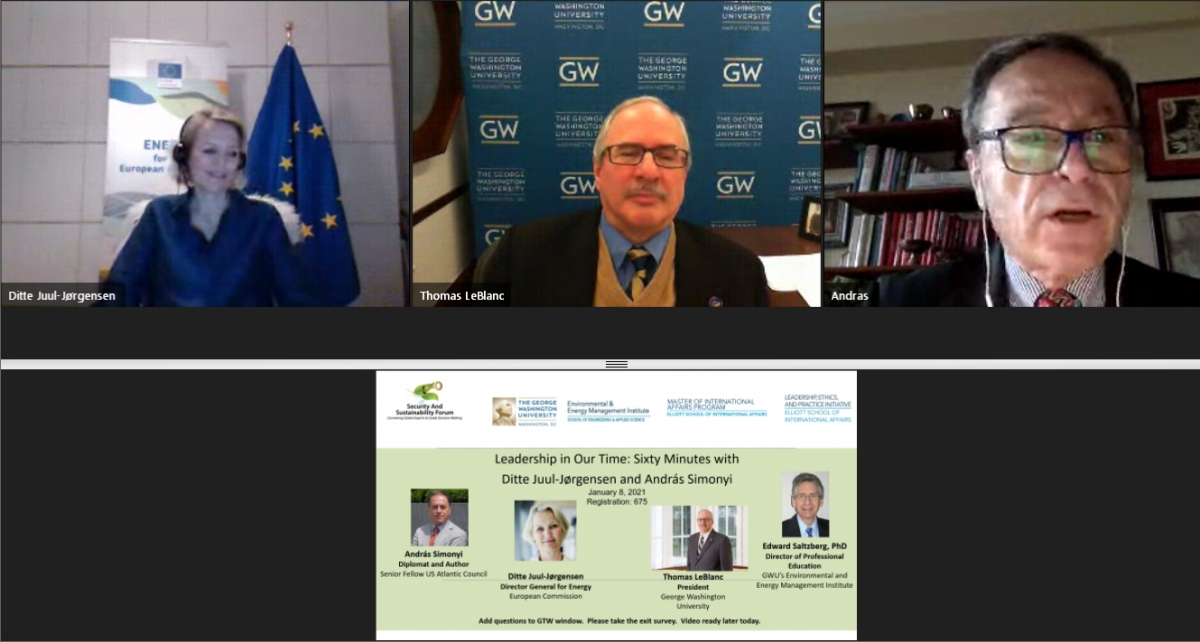
On January 8, the EMSE/SEAS Environmental and Energy Management Institute (EEMI) conducted a webinar titled “Sixty Minutes with Ditte Juul-Jørgensen and András Simony.” GW President Thomas LeBlanc opened the discussion of the webinar, which was the latest in the “Leadership in Our Time” webinar series conducted by the EEMI. Ms. Juul-Jorgensen is the current director general for energy at the European Commission, and Mr. Simonyi is a former Hungarian ambassador to the United States. EEMI Director of Professional Education Dr. Ed Saltzberg moderated the event, which focused on adoption of the European Green Deal, the EU’s goal to become climate neutral by 2050, and predictions of forthcoming improved cooperation with the US. Those who missed the event may watch the recording of it online.
Entrepreneurship News & Events
2021 George Hacks Medical Solutions Hackathon
Saturday and Sunday, January 16 and 17
9:00 am – 5:00 pm ET
Register
The annual George Hacks Medical Solutions Hackathon is a 24-hour hackathon-style event for teams of three to four students who will choose one problem statement from a set of pitches presented by participating healthcare organizations. The problem statements may be patient-specific or involve a systematic issue relevant to the function of the presenting organization. Participation is open and encouraged for those of all backgrounds and majors who have an interest in healthcare innovation. Please email georgehacks gwu [dot] edu (George Hacks) with any questions about the event.
gwu [dot] edu (George Hacks) with any questions about the event.
SEAS alumnus Ben Holmes took part in both Innovate GW and the national I-Corps program. In this new video, Dr. Holmes, a mechanical engineer, talks about how the I-Corps programs helped him develop his company Nanochon and why he thinks every graduate student should take part in one of the programs. To learn more about Innovate GW and the national I-Corps program, GW students and faculty members are invited to register online for an Introduction to Lean Innovation workshop. The workshop will be held the third Friday of every month. During this free, half-day course, GW I-Corps Director Bob Smith provides participants with a better understanding of evidence-based innovation methods used in GW's I-Corps program as well as in Silicon Valley startups and companies. The workshop is open to everyone, whether you are interested in solving problems, starting a business, developing a product, exploring an idea, or simply wanting to learn more about I-Corps and Innovate GW!
Deadline to enter GW New Venture Competition: The 2021 GW New Venture Competition (NVC) application is open for any GW student (enrolled in a full degree program) to apply. Applications are due on February 3, at 1:00 pm ET. Watch the NVC video.
GW Office of Innovation and Entrepreneurship Events:
Introduction to Lean Innovation
Friday, January 15
1:00 – 3:30 pm
Register (A virtual room link will be sent to you later)
Do you hope to solve a global problem, start a new business, develop a new product, or simply have an idea? We’re inviting the entire GW community to attend a half-day introductory workshop, offered monthly every 3rd Friday, to learn how savvy innovators start the process.
Human Centered Design Workshop: “Designing Innovative Solutions for Social Challenges”
Tuesday, January 19
5:00 – 6:00 pm
Register (A virtual room link will be sent to you later)
This experiential and interactive workshop exposes students to the tools, tactics, and frameworks used by innovators, entrepreneurs, and designers to empathize with populations they seek to serve, define problem sets, and come up with innovative solutions.
Create Professional Looking Videos Fast with Adobe Rush
Thursday, January 21
12:00 – 1:00 pm
Register (A virtual room link will be sent to you later)
This workshop will guide you through everything you need to know about creating professional looking videos in the blink of an eye using Adobe Premiere Rush! The lightning fast workflow of Rush allows you to focus on telling your story without having to get too bogged down learning complicated tools and tricks. By the end of this workshop you will know all the essential steps of producing your own professional looking video. Adobe Rush, along with all of the Creative Cloud Applications are available to all GW students, faculty, and staff as part of GW's status as an Adobe Creative Campus.
Hackathon: “Innovate the Future of the Built Environment”
Friday, January 22 – Friday, January 29
1:00 – 4:30 pm
Register (A virtual room link will be sent to you later)
Join the design sprint to improve the ways people interact with the physical world! In partnership with Arup, the GW Office of Innovation & Entrepreneurship is looking for solutions to improve the ways people interact with the physical world through the built environment. This virtual, experiential, and interactive hackathon exposes students to core problem statements in the built environment and physical world focusing on UN Sustainable Development Goals, specifically, on #6: Clean water and sanitation, #7: Affordable and clean energy, #11: Sustainable cities & communities, and #12: Responsible consumption and production.
2021 GW New Venture Competition 101: “Insider Tips on How to Compete”
Saturday, January 23 | 1:00 – 2:00 pm and
Tuesday, January 26 | 5:00 – 6:00 pm
Register (A virtual room link will be sent to you later)
Did you know that the GW New Venture Competition (GW NVC) is one of the largest collegiate entrepreneurship competitions in the country? Students will be vying for over $500,000 in cash and prizes to help take their startup to the next level. Want to learn more? Join us for a virtual discussion with the NVC team to get tips and tricks on how to make your application a winning one!
GW New Venture Competition Alumni Panel
Wednesday, January 27
5:00 – 6:30 pm
Register (A virtual room link will be sent to you later)
Are you thinking of entering the 2021 GW New Venture Competition yourself or curious about what it’s like to participate? Find out from our past NVC student alumni panel. Plus learn about their tips on how to make it to the NVC finals and what they wish they had known before applying. Join us for a great panel discussion with our NVC alumni panelists.
External Events
GW Undergraduate Series: “The First Moon Landing: A History in Artifacts”
Tuesday, February 2
2:30 – 3:30 pm
Register (Students must register in advance using their GW email address. After registering, you will receive a confirmation email containing information about joining the meeting.)
The material legacy of the Apollo program is immense. Thousands of artifacts from rocket engines to spacesuits to the ephemera of life aboard a spacecraft are represented in the Smithsonian’s collections. In this presentation, Dr. Teasel Muir-Harmony, curator of the Apollo collection at the Smithsonian National Air and Space Museum, reassesses the history of the Moon landing through the most evocative objects of the Space Age. Dr. Rachel Riedner, associate dean of undergraduate studies, will moderate the discussion. This session is part of the GW Undergraduate Series, “Can't Get to DC Museums, Historical Sites, and Political Institutions? We will bring them to you!”




